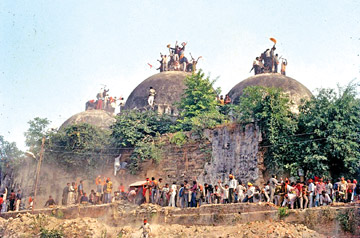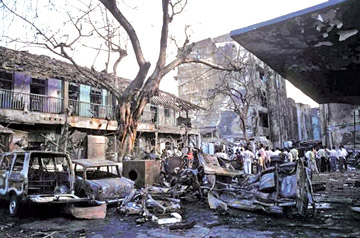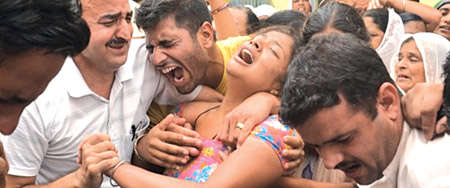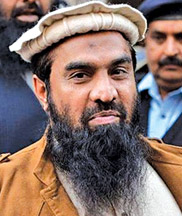Targeting the innocent
Prime victims of terrorism in South Asia are
civilians :
by B.C Sharma
 |
| Babri Masjid
demolition on Dec. 6, 1992 Photo : Sanjay Sharma Indiapix
Network |
 |
| Mumbai blasts
of 1993 - Scene of carnage |
 |
AMRITSAR,
INDIA - Wailing family members of deceased Punjab police home
guard jawan during cremation who died in a terrorist attack on
Dinanagar police station on July 28, 2015 in Amritsar, India.
Heavily armed men dressed in military fatigues stormed a police
station on Monday morning in Punjab’s Gurdaspur district,
killing four policemen, including Gurdaspur superintendent of
police Baljit Singh, three civilians and three militants.
Photo : Sameer Sehgal Hindustan Times via Getty Images |
Terrorism has now become the principal weapon in the hands of States
fighting wars with each other over one issue or the other. While armies
get better armed and increase in size, wars are no longer between armies
but between proxy groups, the terror outfits. Casualties are no longer
military but overwhelmingly civilian. Terror and counter terror have led
to the emergence of the 'National Security State' with militarization of
civilian administrations, restrictions on civil and human rights
covering all citizens whether they are involved in terror or not. And
for the sake of 'power projection', fair trials and the Rule of Law are
thrown to the winds.
 |
|
Zakiur Rehman Lakvi,
accused in the 2008 Mumbai serial blasts case. |
The 'terror war' in which India and Pakistan are embroiled since the
last military confrontation in December 1971, has badly affected
civilians who have nothing to do with terrorism or the Indo-Pakistan
conflict, and has led to the militarization of society, police brutality
and miscarriage of justice. Recent incidents on the India-Pakistan
border could well be a harbinger of another military stand off or
retaliatory strikes across the border in which, again, the immediately
affected will be civilians.
On August 5, 20-year-old Mohammad Naved alias Usman Khan, a
Pakistan-based Lashkar-e-Taiba (LeT) terrorist, who was captured
following an attack on an Indian Border Security (BSF) truck in Udampur
on the India-Pakistan border, had the gumption to tell his
interrogators: " I came from Pakistan to kill Hindus. It's fun doing
this."
On July 27, as India was mourning the death of its modern icon,
A.P.J.Abdul Kalam, three LeT militants attacked Gurdaspur in Punjab and
killed a number of civilians and policemen including a Deputy
Superintendent. Since the attack on Gurdaspur took place following signs
in the social media of a revival of Sikh militancy, Prof. C. Christine
Fair of Georgetown University's Strategic Studies Program suspected a
Pakistani intention to revive Sikh militancy in India. "There is reason
to believe that Pakistan seeks to reopen the Punjab as a new theatre of
terrorism," Fair wrote in Huffington Post on August 4.
Through the 1970s and 1980s, Punjab, an Indian state bordering
Pakistan, was torn apart by a Pakistan-backed terrorist movement for an
independent Sikh state called 'Khalistan.' Terrorism and counter
terrorism had claimed thousands of civilians in Punjab over more than a
decade.
The wanton destruction of Babar's mosque (better known as the Babri
Masjid) at Ayodhya in the north Indian state of Uttar Pradesh on
December 6 , 1992 by the Bharatiya Janata Party and other Hindu
extremist groups, was followed by anti-Muslim riots in India's
commercial metropolis of Mumbai which reportedly claimed 1000 civilian
lives. In retaliation, on March 12, 1993, the Mumbai-based Tiger Memon
and his family, along with Dawood Ibrahim, an Indian gangster-turned
terrorist based in Karachi, Pakistan, set off a series of bombs in
various parts of Mumbai which claimed 257 lives and injured over 700.
On December 13, 2001, five Pakistan-trained LeT militants and cadre
of the Students Islamic Movement of India (SIMI) attacked the Indian
parliament while it was in session, killing six policemen, two
parliament security personnel and a gardener. The attack, which shook
India to its very foundations, resulted in an eyeball to eyeball
military standoff all along the India-Pakistan border, triggering fears
of a nuclear war. According to activist Arundhati Roy, the extended
stand off led to the death of 800 Indian soldiers even though there was
no exchange of fire between Indian and Pakistani forces.
Meanwhile, perhaps because of the anti-Muslim and anti-Pakistan
ranting by powerful Hindu extremist groups in Mumbai, like the Shiv Sena,
the commercial capital of India became a target of Pakistani/local
Muslim terrorism. On March 13, 2003, a blast killed 10 civilians. On
July 28, 2003, four died in a bus bomb blast. Two blasts on August 25,
2003, claimed 44 lives. On July 11, 2006, a series of explosions in
eleven places set off by the LeT and SIMI, claimed 209 lives ( including
of 22 foreigners). On November 26, 2008, the Karachi-based LeT launched
a daring seaborne attack on Mumbai, the first ever in the history of
terrorism in India. The attack, which lasted three days, claimed 166
lives, mostly civilian. Equated with the '9/11' Al Qaida airborne attack
on the twin towers in New York, the November 26, 2008 attack is referred
by the Indian media as '26/11'.
Miscarriage of Justice
In addition to great losses of innocent civilian lives in terrorist
attacks, miscarriages of justice have also taken place. The latest
example is the hanging of Yakub Khan on July 30 this year for
facilitating the 1993 Mumbai blasts. Former Indian intelligence officer
B. Raman, had written in www.rediff.com in 2007 that Yakub had
collaborated with the Indian agencies on the tacit understanding that he
would not be given the maximum sentence of death. His testimony had
helped India unravel Pakistan's role in the conspiracy, and played a
vital role in India's bid to get Pakistan dubbed as a 'sponsor of
terrorism' in the international arena. But the 'deal' between Yakub and
the Indian agencies was never made part of the case material, with the
result, Yakub's pleas for clemency failed to move judges and President
of India.
Raman pointed out that a promise made on behalf of a sovereign state
had not been kept.
Erosion of freedoms
Judges had also ignored the report of the Srikrishna Commission on
the blasts. Justice Srikrishna had noted that the Memon family had
suffered 'extensively' in the anti-Muslim riots which preceded the
blasts and concluded that there was, on account of the suffering, a
'deep rooted motive for revenge'.
There had been a miscarriage of justice even in the hanging of Afzal
Guru, the Indian Kashmiri who was accused of facilitating the attack on
the Indian parliament in 2001. B.Raman wrote that Afzal should not have
been sentenced to death as he was only a 'conspirator' and not a
'perpetrator'.
Afzal was a Pakistan-trained militant in the later 1980s but had
surrendered to the Indian authorities. But the police would not allow
him to lead a normal life after being discharged. He was reportedly
tortured and made to do the police's bidding. According to Arundhati
Roy, who doubted the veracity of New Delhi's claims on the attack on the
Parliament on 13 grounds in an article in The Guardian on February 18,
2003, Afzal was framed.
In Pakistan, the anti-terror war has led to greater militarization
and the reduction of civil liberties, says the latest report of the
International Crisis Group (ICG). The December 16, 2014 attack by the
Tehreek-e-Taliban Pakistan (TeTP) on an army-run school in Peshawar
killing 150 kids, led to the formulation of a National Action Plan
(NAP). But the ICG says that the NAP has only increased the power of the
military over the civilian administration.
"After inaugurating the NAP on 24 December 2014, the Sharif
government implemented two major demands of the military without delay:
lifting the predecessor government's 2008 moratorium on the death
penalty; and passing on 6 January 2015, the 21st constitutional
amendment, empowering special military courts to try all terrorism
suspects, including civilians."
"Yet, the vast majority of the 176 executions since late December
have been for crimes unrelated to terrorism.
The military courts weaken constitutional protections and due
process. Other newly-created parallel structures, including provincial
Apex Committees, enable the military to bypass representative
institutions and play a more direct role in governance. Armed with new
legal tools, the military has further marginalized civilian institutions
in devising and implementing counter-terrorism policy," the ICG report
says.
The ICG further says that the Pakistan military distinguishes between
'bad' Jihadi groups, (those targeting the security forces), and 'good'
Jihadi groups (those perceived to promote its strategic objectives in
India and Afghanistan).
Invidious distinction
"Anti-India outfits such as Jamaat-ud-Dawa (JD), the renamed version
of the banned Lashkar-e-Tayyaba (LeT), have even expanded their
activities through so-called charity fronts. Military-backed Afghan
insurgents, such as the Haqqani Network, have not been targeted in
ongoing operations in the North Waziristan agency of the Federally
Administered Tribal Areas (FATA). Instead, the Haqqanis, like the LeT/JD,
have been kept off Pakistan's list of terrorist groups."
Egged on by its military, the Pakistani Establishment refuses to hand
over to India the prime accused in the 1993 Mumbai blasts case, namely
Dawood Ibrahim and Tiger Menon.
In 2009, Pakistan's then Interior Minister Rehman Malik, had
categorically stated that there was evidence that Zaikur Rehman Lakhvi
of the LeT had masterminded the 2008 Mumbai attack.
Pakistan police arrested Lakhvi, but he was not only allowed to
conduct his operations from the jail through internet and phone.
According to the BBC, there were no restrictions on visitors. And in
April this year Lakhvi was released on bail supposedly for lack of
evidence. India's Home Minister Rajnath Singh said that this was 'very
disappointing'.
Pakistan alleges that India has been fomenting terror and separatism
in Baluchistan and FATA, but till date, no evidence has been produced to
support this charge. However, terrorist attacks have become routine in
Pakistan with a multiplicity of Jehadi groups going on the rampage
killing civilians as well as soldiers, despite the stringent National
Action Plan against terrorism. |

